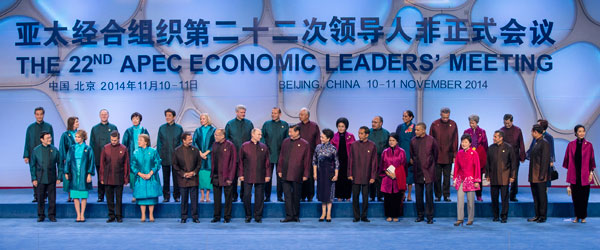President hails regional trade move
 0 Comment(s)
0 Comment(s) Print
Print E-mail China Daily, November 11, 2014
E-mail China Daily, November 11, 2014
President Xi Jinping said the establishment of the Free Trade Area of the Asia-Pacific will consolidate regional economic integration and is compatible with existing regional free trade arrangements.
 |
|
President Xi Jinping stands with other leaders during the APEC Summit family photo in Beijing November 10, 2014. [Photo by Xu Jingxing / China Daily]? |
The launch of the Free Trade Area of the Asia-Pacific process, which points out the direction for Asia-Pacific cooperation, is one of the expected achievements Xi outlined for the ongoing Asia-Pacific Economic Cooperation meetings.
The Free Trade Area does not go against existing free trade arrangements, which are the potential pathways to realize the FTAAP goals, Xi said when speaking at the dialogue between APEC leaders and representatives of the APEC Business Advisory Council on Monday.
The FTAAP can be the "aggregation" of existing free trade arrangements, and the aim of pushing forward the FTAAP process is to consolidate the regional integration and define long-term goals, the president noted.
He said strengthening comprehensive connectivity and infrastructure development are fundamental issues for regional economic development.
Establishing the new Asian Infrastructure Investment Bank fits well with road maps for the Silk Road Economic Belt and 21st Century Maritime Silk Road projects, and the bank will benefit all parties, Xi said.
The bank, along with other multilateral development agencies, will contribute to economic integration in the region, he added.
Xi added that China will maintain "medium- to high-speed growth" in the long run and will continue to improve the quality of economic growth.
China is confident of achieving equilibrium with reform, development and stability, as well as steady growth and economic restructuring, the president said.
Xu Hongcai, a senior economist at the China Center for International Economic Exchanges, a leading think tank, said the country is ready to accept a lower rate of growth, and a slowdown is part of the "new norm" in China.
The country's annual economic growth slowed to 7.3 percent in the third quarter, the lowest since the global financial crisis. The economy is targeted to grow at about 7.5 percent this year.
The Asia-Pacific region is facing a significant and promising outlook for development as well as many uncertainties, Xi said. APEC needs to recognize new features and new trends in the regional economic situation, he added.
As a beneficiary and active promoter of regional cooperation, China is willing to push forward free trade and investment in the region and step up efforts for regional economic integration, the president said.
Xi said several concrete outcomes will be achieved at this year's summit, including the launch of the regional free trade area process and the outlining of a blueprint to strengthen links.





